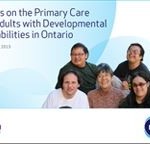
Background Last week we posted about the recent multi agency inspection of responses to people with learning disabilities in the criminal justice system which suggested that information was poorly shared and that significant improvements were possible. The researchers in this study worked in a large London metropolitan police station and were interested in looking at [read the full story…]









